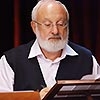Baal HaSulam, ”The Essence of the Wisdom of Kabbalah”: Any reasonable person will understand that when dealing with spiritual matters, much less with Godliness, we have no words or letters with which to contemplate. This is because our whole vocabulary is but combinations of the letters of our senses and imagination. …
It is particularly so where one needs to find some rationale in these words to help one in the negotiations customary in the research of the wisdom. Here the sage must use rigorously accurate definitions for the eyes of the observers.
If we expressed in our words everything we feel, each of us will create our own language, our own encyclopedia, etc., and we would be unable to communicate with each other. Therefore, what we can and should do is take the words, expressions, and definitions based on our essence.
This is exactly what Kabbalah does. It says that a person consists of desire that is divided into five kinds: zero, one, two, three, and four. In these five types of desires, we feel various positive and negative fulfillments, and everyone has them. Thus, everything consists only of desire.
Therefore, if we adhere to a clear Kabbalistic language, we will not go astray. We will speak the same language. It was so before the shattering in ancient Babylon when all people spoke one language, Aramaic, in which The Book of Zohar is written.
The Aramaic language is good because it comes from the essence of nature itself. The five levels of desire, from which each of us consists, generate five definitions. This language is based on them.
[253760]
From KabTV’s “Fundamentals of Kabbalah,” 9/15/19
[253760]
From KabTV’s “Fundamentals of Kabbalah,” 9/15/19


No comments:
Post a Comment